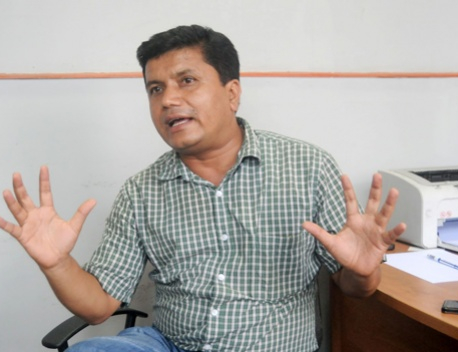
OR
NEPALGUNJ, Nov 18: While it was believed that corruption mostly thrived in the education sector, the scenario has largely changed under the country's new federal structure. Now, local units are said to be the most corruption-prone offices.
Complaints registered at the Commission for the Investigation of Abuse of Authority (CIAA) from Banke, Bardiya and Dang districts show corruption is pervasive in the local governments of these districts. Officials at the anti-graft body say corruption seems to be rampant at the local units.
CIAA's Butwal-based regional office has received 315 complaints of corruptions in the current fiscal year so far. Of them, 106 complaints are against alleged corruption and irregularities at the local units.
“Out of the total complaints, 47 are against the local units of Banke, 26 against the local units of Bardiya and the remaining 33 against the local units of Dang,” said Nirajan Sharma, information officer at Butwal office of the CIAA.
According to him, most of the corruption complaints against local units are regarding promotion and construction of infrastructures. Sharma added that the CIAA is filing cases on the basis of complaints received and news from media.
The CIAA also has 65 pending cases of corruption. These cases are related to the education sector. After the local units and the education sector, the community forests face the highest number of complaints for alleged corruption. The CIAA has registered 44 complaints against forest offices.
Janardan Acharya, the principal of a local school in Nepalgunj, said many government officials are involved in corruption. “This is why it is almost impossible to eradicate corruptions here,” he added.
Another local Namaskar Shah said the reason behind the rising corruption is the lack of a self-monitoring mechanism at the local units. “The local units do not monitor their own employees. In order to bring change, they should be transparent in their activities and held accountable.”
You May Like This

Local unit heads chairing school mgmt committees illegal: Ministry
KATHMANDU, Feb 25: While political interference and the partisan interests of teachers and school management officials are widely blamed for the... Read More...

Defamation case a planned attempt to discourage media from exposing corruption: FNJ
KATHMANDU, Sept 3: The Federation of Nepali Journalists (FNJ) has denounced the defamation case filed against Nagarik Daily by Nepal Oil... Read More...

Impeachment of Karki is a must for corruption free Nepal: Lawmaker Adhikari (with video)
KATHMANDU, Oct 25: CPN-UML lawmaker Rabindra Adhikari has said the impeachment motion tabled in the Parliament is not the issue... Read More...





Just In
- MoHP cautions docs working in govt hospitals not to work in private ones
- Over 400,000 tourists visited Mustang by road last year
- 19 hydropower projects to be showcased at investment summit
- Global oil and gold prices surge as Israel retaliates against Iran
- Sajha Yatayat cancels CEO appointment process for lack of candidates
- Govt padlocks Nepal Scouts’ property illegally occupied by NC lawmaker Deepak Khadka
- FWEAN meets with President Paudel to solicit support for women entrepreneurship
- Koshi provincial assembly passes resolution motion calling for special session by majority votes






_20220508065243.jpg)






Leave A Comment